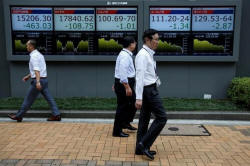|
Selloff gathers pace as
stimulus pullback fears deepen
 Send a link to a friend
Send a link to a friend
 [September 12, 2016]
By Abhinav Ramnarayan [September 12, 2016]
By Abhinav Ramnarayan
LONDON (Reuters) - European stocks and
bonds fell in a volatile market on Monday, hit by growing concerns that
global central banks' commitment to the post-crisis orthodoxy of
super-low interest rates and asset purchase programs may be waning.
German Bund yields rose further above zero to as high as 0.06 percent,
their highest since Britain's Brexit vote in late June, and the rise in
lower-rated euro zone countries' yields was even sharper.
Major European stock indexes fell as much as 2 percent, putting them on
course for their biggest losses since June, and Wall Street futures
pointed to a fall of 0.7 percent at the open <ESc1>.
Selling was driven by revived prospects of the U.S. Federal Reserve
hiking rates next week, and concerns that the European Central Bank and
the Bank of Japan may be slowing their monetary policy easing efforts.
"It's a pretty broad-based sell-off on an increasing view that perhaps
central banks are going to draw back from providing ever more easing,"
said RBC European economist Cathal Kennedy.
"The BOJ and the ECB ... are questioning the effectiveness of their own
policy. Add to this an increasing probability that the Fed will raise
rates sooner rather than later."

The fear of another "flash crash" such as happened last year - when
10-year Bunds rose from 0.16 percent in late April to 0.77 percent in
just over two weeks, may also be preying on investors' minds.
"Most focus at the moment is on a possible re-think by central banks and
a move away from aggressive easing and the possibility of a new sell
off," said Jaime Costero Denche, a bond strategist at BBVA.
"I don't think a sell-off such as last May (2015) is likely, but that is
the market fear at the moment," he said.
Earlier, Asian shares suffered their sharpest setback since June as
investors were rattled by rising bond yields and talk that U.S. rates
might rise as early as next week.
Hong Kong's benchmark stock index fell more than 3 percent, its biggest
one-day drop in seven months.
The sell-off there also followed reports that the Bank of Japan may look
to steepen the Japanese yield curve at a policy review this month, with
markets worried that, if it goes down that path, tapering buying of
long-dated bonds may be among the options.
Some Fed members have been talking up the September meeting as being
"live" for a rate hike, even though futures only imply a one-in-four
chance of a move then.
Three more Fed officials are expected to speak later on Monday,
including board member and noted dove Lael Brainard, and any hint of
hawkishness would likely further pressure bonds and equities.

[to top of second column] |

Passersby walk past in front of electronic boards showing Japan's
Nikkei share average (L), the Japanese yen's exchange rate against
the U.S. dollar (C), British pound (R) and Euro (2nd R) outside a
brokerage in Tokyo, Japan, July 6, 2016. REUTERS/Issei Kato -
RTX2JVPG

U.S. dollar at 102.06.
"Market participants are wondering if maybe she (Brainard) is being
wheeled out to give the market one last warning of a rate hike at next
week's meeting," said Marshall Gittler, head of research at broker
FXPRIMUS.
"The thinking is that if someone as dovish as she starts talking like a hawk,
people will notice. Her speech will be closely examined."
Such risks led Wall Street's fear gauge, the VIX index , to its highest close
since late June on Friday. The Dow shed 2.13 percent on Friday, while the S&P
500 lost 2.45 percent and the Nasdaq 2.54 percent.
SEEKING SAFETY
In the forex market, the risk aversion benefited perceived safe havens such as
the yen while hitting carry trades in higher yielding currencies including the
Australian dollar.
The Aussie has lost 2.25 percent against the yen in two sessions to stand at
76.52, while the Japanese currency was firm on the
The euro fell marginally against the dollar to $1.1220 after weak German trade
data dragged it down on Friday from a high of $1.1285. The dollar index , which
tracks it against a basket of six currencies, was up marginally to 95.364.
Adding to Monday's jittery mood, Democratic presidential candidate Hillary
Clinton fell ill at a Sept. 11 memorial ceremony and had been diagnosed with
pneumonia.

Markets have generally assumed Clinton would win the presidency and have not
truly considered the implications, both economic and for national security,
should her rival Donald Trump prevail.
Oil prices extended Friday's 4 percent fall in Asia after reports showed
increasing drilling activity in the United States, indicating that producers can
operate profitably around current levels and bring on new supply. [O/R]
Brent crude was off 82 cents at $47.18 a barrel, while U.S. crude lost 85 cents
to $45.03.
(Additional reporting by Wayne Cole in Sydney; Editing by Robin Pomeroy)
[© 2016 Thomson Reuters. All rights
reserved.] Copyright 2016 Reuters. All rights reserved. This material may not be published,
broadcast, rewritten or redistributed. |